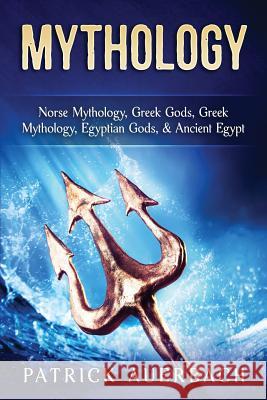Mythology: Norse Mythology, Greek Gods, Greek Mythology, Egyptian Gods, & Ancient Egypt » książka
Mythology: Norse Mythology, Greek Gods, Greek Mythology, Egyptian Gods, & Ancient Egypt
ISBN-13: 9781540600776 / Angielski / Miękka / 2016 / 280 str.
Mythology can refer to the collected myths of a group of people-their collection of stories they tell to explain nature, history, and customs-or to the study of such myths.
As a collection of explanatory stories, mythology is a vital feature of every culture. Many sources for myths have been proposed, ranging from personification of nature or personification of natural phenomena, to truthful or hyperbolic accounts of historical events to explanations of existing rituals.
This book covers:
Norse Mythology In this book you will find information, about Norse Mythology. Norse mythology, or Scandinavian mythology, is the body of mythology of the North Germanic people stemming from Norse paganism and continuing after the Christianization of Scandinavia and into the Scandinavian folklore of the modern period.
Most of the knowledge used to create this book, is from the Icelandic historian and poet, Snorri Sturluson, who has written The Prose Edda around the year 1200.
The Norse gods and goddesses were loved by the Vikings. The Vikings came mainly from Denmark, Norway, Sweden, Iceland, Faroe Island, and Greenland. Greek Gods The ancient Greeks believed there were a great number of gods and goddesses. These gods had control over many different aspects of life on earth. In many ways they were very human. They could be kind or mean, angry or pleasant, cruel or loving. They fell in love with each other, argued with each other and even stole from each other.
The ancient Greeks built great temples and sanctuaries to their gods. They held festivals in their honour, with processions, sports, sacrifices and competitions. Stories of the gods' exploits were told to children by their mothers and to large audiences by professional bards and storytellers. People today still enjoy hearing stories about the Greek gods.
This book tells the tales of gods and goddesses such as Zeus, Aphrodite, Apollo, and Athena and heroes and monsters such as Helen of Troy, Perseus, and Medusa will fascinate and engage your imagination. Greek Mythology Greek Mythology is the body of myths and teachings that belong to the ancient Greeks, concerning their gods and heroes, the nature of the world, and the origins and significance of their own cult and ritual practices. It was a part of the religion in ancient Greece. The Greeks were polytheistic in their religious beliefs. Polytheistic means they believed in and worshiped many different gods. Modern scholars refer to and study the myths in an attempt to shed light on the religious and political institutions of Ancient Greece and its civilization, and to gain understanding of the nature of myth-making itself. Egyptian Gods Worshiped for over three-fifths of recorded history, ancient Egypt's Gods and Goddesses are among the most fascinating of human civilization.. The lives of pharaohs and commoners alike were dominated by the need to honor, worship, and pacify the huge pantheon of deities. From lavish tomb paintings and imposing temple reliefs to humble household shrines, countless tributes throughout Egypt reflect the richness and complexity of their mythology. Ancient Egypt Ancient Egypt's impact on later cultures was immense. You could say that Egypt provided the building blocks for Greek and Roman culture, and, through them, influenced all of the Western tradition. Today, Egyptian imagery, concepts, and perspectives are found everywhere; you will find them in architectural forms, on money, and in our day to day lives. Many cosmetic surgeons, for example, use the silhouette of Queen Nefertiti (whose name means "the beautiful one has come") in their advertisements.
Scroll to the top of the page and click Add To Cart to read more about this extraordinary chapters of history.











